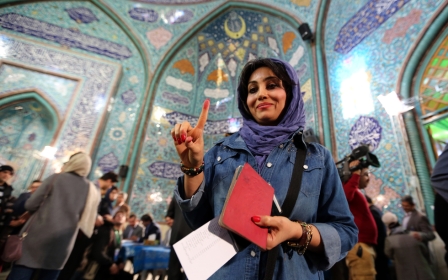Rouhani's allies consolidate gains in Iranian elections

Reformist and moderate Iranian politicians allied with President Hassan Rouhani won a big victory in second round parliamentary elections, official results announced on Saturday confirmed.
The outcome represents a significant realignment of competing factions, with conservative MPs losing their dominance and being outnumbered in the parliament for the first time since 2004.
It also appears to confirm public support for Rouhani, who won a landslide election victory in 2013 and went on to clinch a historic deal with world powers over Tehran's nuclear programme that lifted sanctions.
The results also took to 17 the number of women elected; eight more than at present and the highest tally since the Islamic revolution in 1979.
Almost a quarter of parliament's seats were at stake in run-offs on Friday in what was a crucial showdown between reformists and conservatives seeking to influence the country's future.
Iran's parliament has marginal powers because senior clerics can still veto legislation under the country's theocratic system of government, but the result could open a delicate path to limited social and cultural change.
The return of reformists as a major force heralds a step change after an era of diplomatic clashes over Iran's nuclear programme that, before Rouhani, had left the country isolated.
In stark contrast to the first two-and-a-half years of his presidency, the election result should give him a parliament that supports his government. The outgoing conservative-dominated chamber repeatedly blocked Rouhani and even impeached one of his ministers.
The president's backers made huge gains in the first round on 26 February, in which hardliners critical of the nuclear deal were all but eliminated but reformists still scored eight fewer seats than conservatives overall.
Iran does not have rigid party affiliations, making election outcomes notoriously opaque. Some candidates were backed by both camps, and others stood as independents.
Of the 68 seats that were contested Friday, 38 went to the pro-Rouhani List of Hope coalition, 18 to conservatives and 12 to independents, according to final results published by the interior ministry.
That gave reformists 133 seats in the new 290-member parliament, 13 shy of a majority but more than their rivals' 125 MPs. Remaining seats went to independents who could hold the balance the power.
The contests were taking place in seats where no candidate won a minimum of 25 percent of votes in the first round in February.
Iran's reformists have encouraged foreign investment, support moves for greater diplomatic rapprochement and seek social change and fewer political restrictions at home.
Their electoral gains in February came just six weeks after Tehran's implementation of the nuclear deal.
Around 17 million citizens were eligible to vote on Friday and polling took place in 21 provinces, but not the capital Tehran, as reformists won all of the capital's 30 seats in the first round.
Iran's Supreme Leader Ayatollah Ali Khamenei had urged a strong turnout, saying the vote was no less important than the first round.
Mohammad Reza Aref, a partly US-educated engineer and leader of the reformist pro-Rouhani List of Hope, has set a target of at least another 40 MPs.
Gains for the president's allies will make legislative reforms more likely.
They could also buy time for Rouhani to try and turn around a struggling economy amid concern over the nuclear deal.
Iranian officials including Khamenei have complained that the United States is not honouring its commitments and is in fact taking steps to dissuade non-American banks from doing business with Tehran.
Although the conservatives went backwards two months ago, they did not change tack this time round, keeping up pressure over what they say is a silent agenda among reformists to give up the principles of the revolution.
"We hope that people in this round can have a parliament in line with the goals of Imam and the leadership by electing principlists," said Gholam-Ali Hadad Adel, head of the conservative coalition.
He was referring to revolutionary leader Ayatollah Ruhollah Khomeini and his successor Khamenei, Iran's ultimate authority with powers that far outweigh Rouhani, who was voted into office in a landslide in 2013.
Hadad Adel was a victim of the reformist surge in February, losing his own seat in Tehran.
Middle East Eye propose une couverture et une analyse indépendantes et incomparables du Moyen-Orient, de l’Afrique du Nord et d’autres régions du monde. Pour en savoir plus sur la reprise de ce contenu et les frais qui s’appliquent, veuillez remplir ce formulaire [en anglais]. Pour en savoir plus sur MEE, cliquez ici [en anglais].




